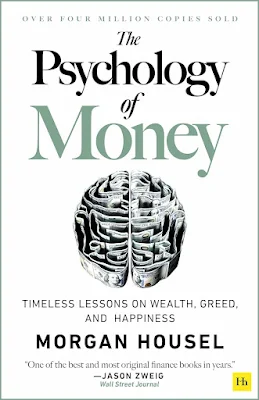A best-seller by Morgan Housel, "The Psychology of Money," examines how people feel and act in relation to money. The basic thesis of the book is that managing money is a soft talent that is psychologically dependent rather than a rigorous science.
Your experiences, beliefs, emotions, and biases all have an impact on how you handle money. Because everyone has a unique perspective and circumstance, there is no one proper approach to managing money.
Housel illustrates his arguments with a variety of anecdotes and examples from psychology and history. He discusses a variety of subjects, including chance, danger, greed, joy, compound interest, prosperity, freedom, and more. He also offers some helpful tips on how to make better financial decisions and get better financial results.
Here are some of the key lessons from the book:
- No one is crazy. Individuals base their financial judgments on their individual mental models of the world, which are influenced by their particular experiences. What is unreasonable to one person may appear rational to another, and vice versa.
- Luck and risk are two sides of the same coin. Though you have no control over them, you may be aware of them and modify your expectations accordingly. When things go well, try not to be too cocky or conceited, and when they don't, try not to be too gloomy or melancholy.
- Never enough. There will always be someone who is wealthier or more prestigious than you, and going after them will only make you miserable. Having a clear definition of what enough means to you and sticking to it are the only ways to be content with money.
- Confounding compounding. Compounding power is difficult to understand because it builds gradually before exploding tremendously. Compounding is best utilized by starting early, investing regularly, and exercising patience.
- Getting wealthy vs. staying wealthy. They call for various abilities and perspectives. Taking chances and utilizing opportunities are key to being wealthy. Being thrifty and preventing losses is key to maintaining wealth. Both components of your financial path must be balanced.
- Tails, you win. The most significant financial occurrences are uncommon and unpredictable, but they have a significant influence on the results. Although you can't forecast them, you can be ready for them by diversifying your investments and leaving yourself a margin of error.
- Freedom. You can buy freedom with money, but only if you spend it sensibly. The key to being free is having control over your time and decisions, and not having a lot of money. Being allowed to refuse requests that conflict with your ideals or objectives is another aspect of freedom.
- Man-in-the-car paradox. Individuals frequently spend money on things that are intended to impress others, but they are unaware that others may not care as much as they believe. The man in the car paradox states that although a person driving a $100,000 car may feel jealous of a person driving a $10,000 car, neither is happier than the other.
- Wealth is what you don't see. The most visible signs of wealth are often the result of debt or spending, not saving or investing. The true wealth is what you don't see: the assets that generate income or grow in value over time.
- Save money. Individuals frequently spend money on things that are intended to impress others, but they are unaware that others may not care as much as they believe. The man in the car paradox states that although a person driving a $100,000 car may feel jealous of a person driving a $10,000 car, neither is happier than the other.
- Reasonable > rational. Making decisions based on logic and evidence is what it means to be rational, but in the world of money, this isn't always practical or desirable. Making choices that are reasonable can ultimately provide better outcomes because they are grounded in humility and common sense.
- Surprise! The world is constantly changing, and so are your financial needs and goals. There are a lot of things you can't plan for, but you can be flexible and adaptive. Likewise, be prepared for both pleasant and unpleasant surprises, and take lessons from both.
- Room for error. In the world of finance, uncertainty, and risk cannot be completely eliminated, but their effects can be lessened by maintaining a buffer or cushion. This entails having sufficient money, insurance, diversification, and time horizon to endure shocks and setbacks.
- You'll change. The person you were ten years ago and the person you will be in ten years' time are not the same. Your tastes, circumstances, and opportunities will evolve over time, just like your prospects and opportunities for financial growth. Be willing to modify your opinions when circumstances change.
- Nothing's free. Everything has a cost, whether it is obvious or not. Every financial choice involves compromises and lost opportunities. As you make a decision, you should be conscious of what you are sacrificing or surrendering.
- You & me. Your financial journey does not involve you alone. Both you and other people have an influence on one another. You should be aware of the connections between your relationships and your finances as well as the impact of each on the other.
- The seduction of pessimism. It's easy to be pessimistic about the future because it seems more realistic and intelligent. But pessimism can also be harmful because it can make you miss opportunities and lose hope. Optimism is not naïve or foolish, but a way of coping with uncertainty and finding solutions.
- When you'll believe anything. We frequently ignore or reject stories that contradict our views in favor of those that support them. This may cause us to make poor financial judgments due to confirmation bias and overconfidence. We should be skeptics of our own narratives and look for further information and arguments.

